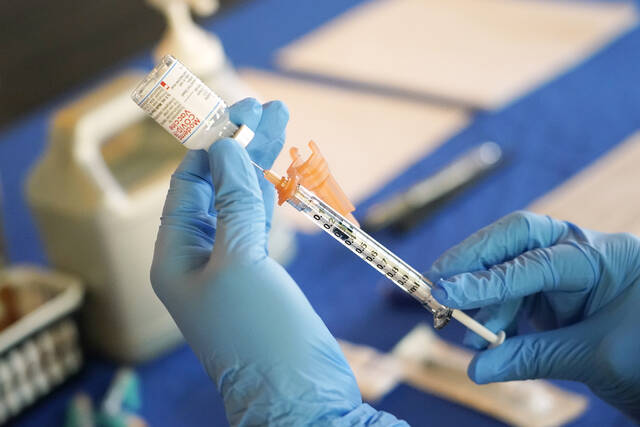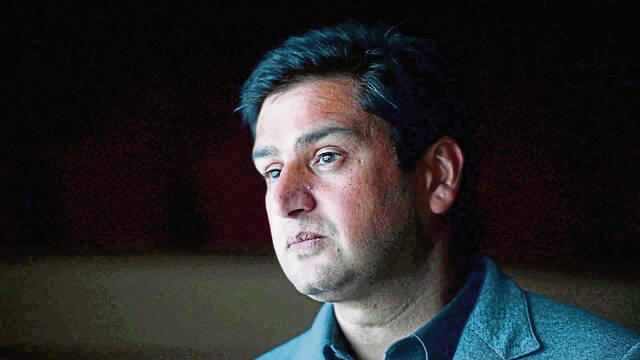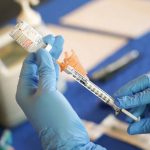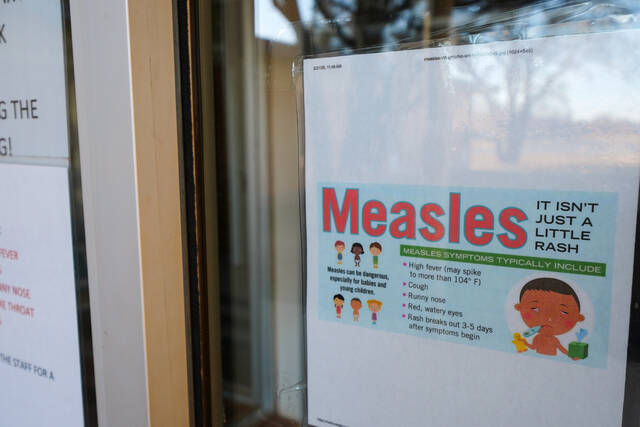Federal health officials want to simplify covid-19 vaccinations and make the procedure similar to an annual flu shot. The U.S. Food and Drug Administration on Monday floated the idea of allowing most adults and children to get a yearly shot to protect against the mutating virus.
Local medical experts had mixed reactions to the proposal.
Pittsburgh-based infectious disease expert Dr. Amesh Adalja, a senior scholar at the Johns Hopkins Center for Health Security, cautions against a “one size fits all” approach.
“I think it’s unclear what the goal is with (yearly) covid vaccinations — prevention of infection or prevention of severe disease — because for low-risk people, they really don’t benefit in terms of reduction of severe disease with additional boosters,” Adalja said. “They may not need to be boosted once yearly or even at all.”
Adalja said someone who has had a bone marrow transplant, for example, may need more frequent boosting than someone who suffers from isolated hypertension.
“I understand the need to simplify and make this easier for people, but I think we want to have an optimal type of program in place, an optimal regimen that’s not just being forced into an influenza pattern just because it’s easy,” he said. “We know throughout this pandemic that simple messages sometimes backfire.
“I don’t think you can telegraph one schedule for everybody.”
Related
• New covid variant — dubbed 'kraken' — found in Western Pa.• Tourists may get refunds over covid measures says E.U. court
• What we know about the ‘kraken’ covid variant XBB.1.5 and why it’s causing concern
Dr. Donald Yealy, senior vice president and chief medical officer for UPMC, said he sees some benefit from an annual covid vaccination.
“The point of a yearly schedule would be twofold,” Yealy said. “One, to simplify that reminder to your immune system instead of trying to count how many months and (wonder) how many injections did you have before. And the second would be it would give an opportunity, if we’re able to change the vaccines based on how the virus changes, to match up that reminder to your immune system. That’s really what we do with influenza — it’s why we have an influenza vaccine each year.
“It is true that, at the same moment in time, some people can have a tremendous benefit and others have a smaller one that’s harder to recognize. And I think that’s where you get into these debates.”
Adalja says the current vaccines already protect against severe disease for more than a year, making an annual covid vaccine unnecessary.
“Protection against severe disease is a function of the vaccine and a function of who is getting vaccinated,” Adalja said. “So, if you vaccinate a healthy 6-year-old, his protection against severe disease is probably 50 years because he already has a low baseline risk of severe disease. You have to take into account what the pre-vaccination probability is of severe disease. So, for a healthy person, it’s very, very, very low to begin with, and now you’ve driven it even lower when they get their primary series of vaccinations. A booster is not going to do much more, whereas somebody that’s 65 years old, it’s not going to be intact for a long time.Immune systems and risk factors for severe disease are not homogeneous amongst the population.”
However, Dr. Joe Aracri, pediatrician and chair of Allegheny Health Network’s Pediatric Institute, said it would be a good idea for school-aged children to receive an annual covid vaccine, and he’s looking forward to seeing what the FDA decides.
The FDA is expected to ask its panel of outside vaccine experts to weigh in at a meeting Thursday.
“We’re starting to evolve more as far as the covid vaccine goes, how it’s administered and who should get it, and I think it’s going to be a really good process going forward to do a yearly vaccine,” Aracri said. “In younger kids and higher risk kids, the two-dose regimen will probably be recommended at first, followed by a yearly covid shot, which is very similar to what we’re doing with the flu shot.
“It’s more of a proactive vaccination where they’ll be able to see emerging strains of the virus, be able to put it in the covid vaccine and be able to give it to kids that way to help prevent the kids from becoming ill or (getting) serious illnesses.”
While parents are being advised to keep their children’s vaccines “up to date,” Yealy said there is no agreed upon definition of up to date or fully vaccinated.
“We know, at a minimum, it means having completed a primary series — usually at least two doses of the Moderna or the Pfizer or one dose of the Johnson & Johnson, which is not used as much. Every singular vaccination after that can enhance immunity, but the amount of benefit is smaller.”
Adalja said people at risk for severe disease, such as those with diabetes, should consider prioritizing advice from the American Diabetes Association over what the FDA or Centers for Disease Control and Prevention recommend.
“What would be better in this process would be if certain professional organizations took over for the kind of individualized dosing rather than having it from the CDC or FDA, where the American Diabetes Association says this is how we think diabetics should be vaccinated based on their age and body mass index status,” Adalja said.













